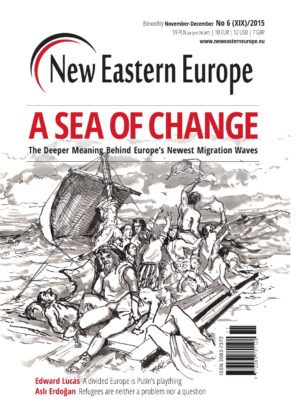Issue 1/2023: In the throes of crises
- You cannot add "5/2019: The Black Sea region. A geopolitical Trojan horse?" to the basket because the product is out of stock.
The consequences of Russia’s invasion are visible not only in Ukraine. The Kremlin has set off or exploited a series of crises that face most European countries as well. We can see it when we shop for basic necessities, such as cooking oil, sugar, milk or eggs, and we can see it on our monthly utility bills, especially heating and electricity. Therefore, in this issue our authors set out to explore how the crises of the last year are connected, used as political tools, especially by Vladimir Putin, and what affect they may have on societies throughout Europe and beyond. Undoubtedly, whether we can overcome the effects brought by the economic, political, energy, and social crises depends largely on what happens in Ukraine. However, western societies cannot ignore the fact that they too have a role to play.
Table of Contents
In the throes of crises
When crises become political tools Marcel H. Van Herpen
Renewing the promise of European solidarity Basil Kerski
Is Europe’s democracy in crisis? Filip Kostelka
The EU economy may not be in the best shape, but Ukraine will not be abandoned Lesia Dubenko
The easy times are behind us, but we are not giving up Iwona Reichardt
Russian infrastructure attacks aim to create humanitarian crisis Maciej Zaniewicz
Tackling the climate crisis in a time of war Isabelle de Pommereau
A nuclear crisis or nuclear discourse? Kinga Anna Gajda
Essays and Analysis
North Macedonia in the crosshairs of Russian propaganda Jovan Gjorgovski
War at the border, protests at home. Pressure mounts on Moldova William Fleeson
How Hungary’s Russia connection undermines EU support for Ukraine Gabriela Greilinger
Georgia’s strong economic performance comes at a heavy price Mackenzie Baldinger
Puzzles of an extremely difficult level. The post-war recovery of Ukraine Maciej Makulski
A Marshall Plan for Ukraine should prioritise harm done to humans, not buildings Maksym Popovych
The ongoing process of de-Sovietisation in Eastern Europe Nino Chanadiri
Interviews
The outcome of the war is crucial not only for the future of Ukraine Interview with Arkady Rzegocki
Lessons of cybersecurity from the war in Ukraine
To war or not to war? Russia’s cyber strategies in Ukraine 2014–22 Dominika Dziwisz and Błażej Sajduk
Putin’s hidden war. How the Kremlin is bombing us on the internet Grigol Julukhidze
Friend or foe? The role of social media during Russia’s war in Ukraine Agnieszka Grzechynka
The threat of digital surveillance Adam Reichardt
Moldova is being forced to adapt to hybrid warfare Marina Bzovîi
Stories and ideas
An independent Georgia or a Tiflis governorate? Wojciech Wojtasiewicz
Back home to the warzone. Emotions of displacement among returning Ukrainian migrants Olena Yermakova
Art, culture and society
This play is a political and social reflection An interview with Ishbel Szatrawska
History and memory
Geopolitics, history and memory games. Jumping from the 20th to the 21st century Georges Mink
How well-brought up girls became unbeatable warriors. The path from battle glory to modern feminism Andrzej Zaręba






































